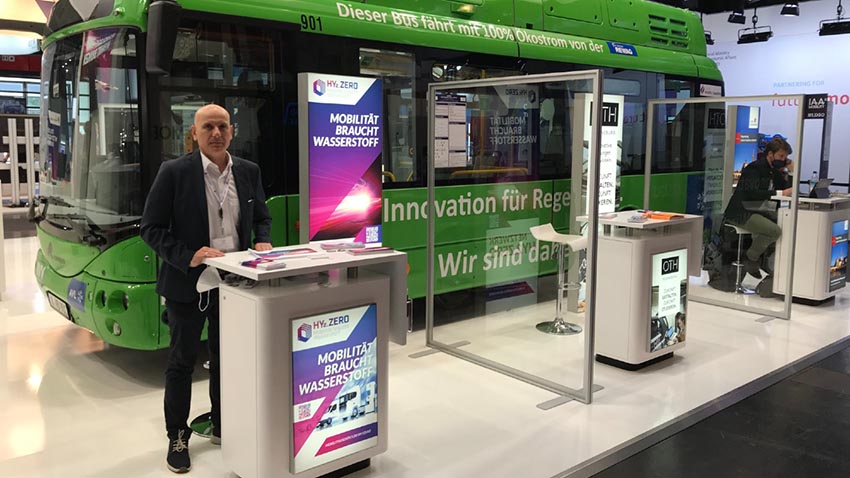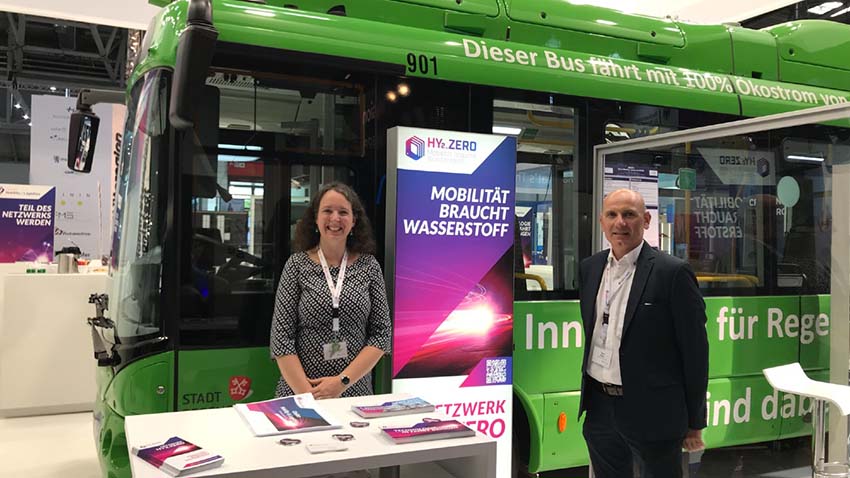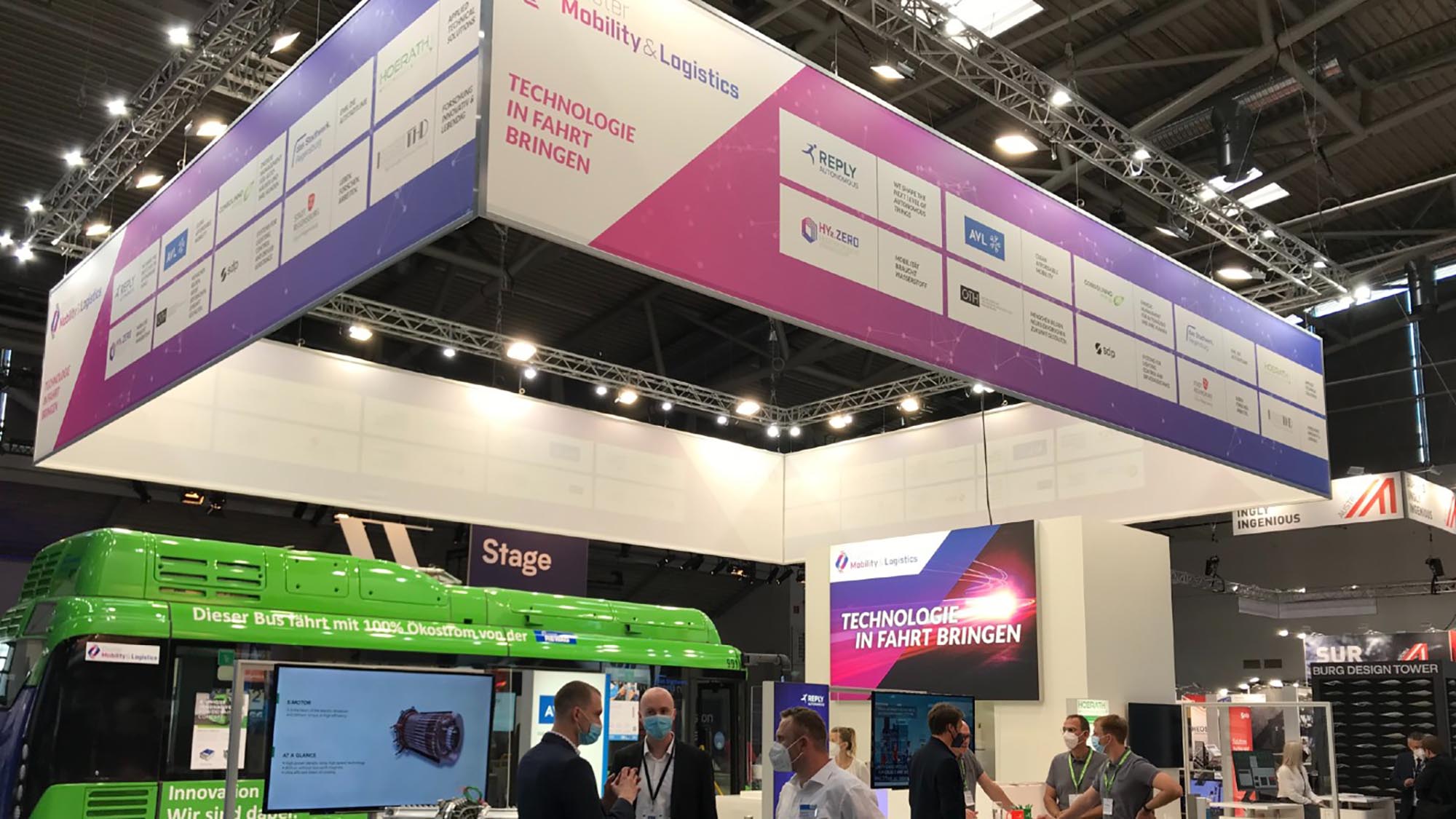Cluster Mobility & Logistics operates under the company R-Tech GmbH that is a subsidiary of the city of Regensburg in Germany, based in the innovation center TechBase. It aims to help the companies in and around Regensburg to innovate the fields of mobility and logistics and through that to strengthen and grow their positions in the market.
Interview with Roxane Wagner, Project Manager at Cluster Mobility & Logistics.
Easy Engineering: A brief description of the organization and its activities.
Roxane Wagner: Only recently, both focus points – mobility & logistics – were brought together into one cluster in order to use the synergies that exist between those two industries and connect more of our members that share the same interests.
This leads to the main activities that we pursue as a cluster because in order to continue making Regensburg a business location the businesses in the area have to thrive. Through the careful connection of the right businesses with one another as well as the inclusion of universities or research institutes, project ideas are created and innovations pursued in research and development projects that are funded by the state or the government. We, as a cluster, make these connections happen through trade fairs, conventions or workshops we host. Furthermore, through our network we bring attention to our members and market their competences. Lastly, as mentioned before the research and development projects are funded by the state or the government. We scout the current available tenders and match our project ideas to them.

E.E: What are the main areas of activity of the organization?
R.W: Both of our main areas, mobility and logistics, are subdivided into three categories which indicate the trends we try to pursue in both industries. The mobility focus has the three categories: Vehicles & Infrastructure, Sustainable Mobility as well as Data & Networking.
The first of the three categories aim to find solutions in the fields of clean mobility for vehicles by exploring new and alternative fuels or create innovative mobility concepts. Furthermore, another important topic is the integration of information into the existing infrastructure in order to keep up with the internet of things that fosters the development of the connection of vehicles and infrastructures.
The sustainable mobility is split into two focal points with on the one hand intelligent mobility, which aims to use more traffic and mobility date to lead to a reduction of emissions. On the other hand, to create solutions for an autonomous mobility.
Lastly, the data and connection category explore answers for a digitalized mobility with information and communication systems directly in the vehicle itself as well as the creation of a mobility data ecosystem in order to avoid data silos and in return profit from the use of data.
Manufacturing logistics, Intralogistics and Transport logistics build the three categories for the logistics focus.
In the forefront of the manufacturing logistics stands the focus of a digitalized production where topics of Industry 4.0 or a smart factory are explored.
The intralogistics subcategory aims to find solutions how to process and connect the massive amount of information that accrues inside an organization in order to optimize the process and warehouse systems.
The transport logistics is crucial, as it is the backbone of the German economy. Therefore, the cluster seeks to find solutions that improve its agility, flexibility, efficiency and efficacy in order to improve the value chain.

E.E: What’s the news for 2022 about new directions?
R.W: A new direction that we are following since mid-2021 is the topic of hydrogen as we created the hydrogen network HY2.ZERO with 31 partners ranging from businesses and start-ups, universities to communities or governmental institutions, as the urgency to meet the climate goals is ever increasing. Keeping this in mind, we established a platform for interested parties to come together and work on research projects related to fuel cells and hydrogen.
The network follows three key areas of research:
First, the production of fuel cell systems as currently the manufacturing processes are too time consuming and costly and need to be made more efficient. Second, the system technology of fuel cells with the hard- and software. This is due to the fact that the power electronics, for example, play a crucial role in saving costs and in increasing the efficiency degree of fuel cells. Lastly, the onsite production of hydrogen. The underlying reason is that hydrogen is a fleeting gas. It needs to be converted for it to be transported, one option being ammoniac. However, if at critical locations the hydrogen can be produced onsite, such as at logistics distribution centers the fuel cell vehicles could easily refuel the hydrogen.
Currently we are pursuing four projects and are in the stage of creating project drafts to hand into outstanding tenders. Two of the projects have the goal of improving fuel cell components and their impact on the efficiency of the powertrain. Whereas the other two projects are dedicated to innovations in the production of hydrogen.

E.E: What can you tell us about market trends?
R.W: We identified hydrogen and fuel cells as a new emerging trend in the next years in the mobility sector because hydrogen is a flexible energy source that will be used to reduce CO2 emissions and reconstruct the energy system. However, in order for hydrogen to make a change in the current energy system its production needs to utilize energy from renewable energy sources.
In line with this trend, many countries have already implemented hydrogen initiatives to foster the necessary ecosystem for hydrogen and fuel cells to be part of the solutions in order to reach the goals of the Paris climate agreement. Germany is also one of the countries that implemented hydrogen and fuel cells as a strategy in the climate protection program of 2030.
Due to this trend, the European as well as the global demand for hydrogen will also drastically increase in the next years and will double by 2030. This will bring about a significant increase in the revenue.
E.E: What estimations do you have for 2022?
R.W: We estimate that the mobility sector will further change in 2022. We already observed that hydrogen is said to play a more crucial role and therefore, created a network to assist in this transformation.
In addition, we believe that the shift towards battery-operated cars will further increase as the big car manufacturing companies are clearly positioning themselves in this new market for the next years to come. This leaves many supporting businesses that work in the traditional automotive industry to struggle to survive. Especially Bavaria is a region and market that was significantly influenced by the automotive industry in the last decades with many businesses forming to serve this industry. This transition in the mobility sector leads us with multiple other actors from Bavaria to seek solutions for the many businesses in this industry. The goal is to provide possibilities for those supporting companies to transform and adapt with the changing sector in order to prevent them from closing and leading to a massive loss of employment opportunities in the region.

